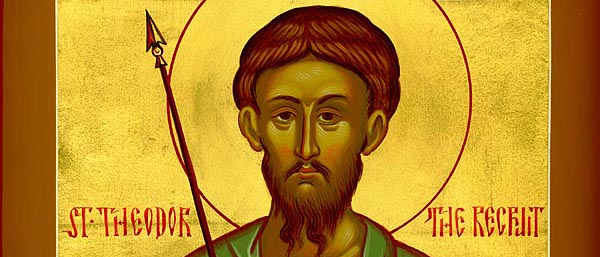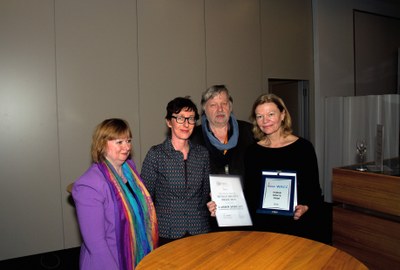Culture
What is the Triodion?
6. March 2018 - 9:12 This is the Orthodox liturgical book that contains the variable portions of the Liturgy and other services for a particular period of the Orthodox ecclesiastical calendar. It begins on the fourth Sunday before the Great Lent, the Sunday of the Prodigal, and ends on Saturday of the Holy Week. Triodion is also called the period between the Sunday of the Publican andPharisee. The name derives from the fact that during the season the Canons contain only three odes instead of the usual nine. The canon is a series of nine hymns, ‘odes’ used at the Orthros (Matins). The nine odes vary so as to correspond with the theme of the particular feast. The introduction of canons is ascribed to St. Andrew of Crete. Other famous authors of Canons are Melodos, St. John Damascus, and St. Theodore the Studion.(Source: Bulletin of St. Nicholas Serbian Orthodox Church, Steelton, Pa.2010)
This is the Orthodox liturgical book that contains the variable portions of the Liturgy and other services for a particular period of the Orthodox ecclesiastical calendar. It begins on the fourth Sunday before the Great Lent, the Sunday of the Prodigal, and ends on Saturday of the Holy Week. Triodion is also called the period between the Sunday of the Publican andPharisee. The name derives from the fact that during the season the Canons contain only three odes instead of the usual nine. The canon is a series of nine hymns, ‘odes’ used at the Orthros (Matins). The nine odes vary so as to correspond with the theme of the particular feast. The introduction of canons is ascribed to St. Andrew of Crete. Other famous authors of Canons are Melodos, St. John Damascus, and St. Theodore the Studion.(Source: Bulletin of St. Nicholas Serbian Orthodox Church, Steelton, Pa.2010)
The Serbian Royal Family just gained a new member
27. February 2018 - 14:55 Their Royal Highnesses Crown Prince Alexander and Crown Princess Katherine announce with joy that the Royal Family just gained a new member. HRH Princess Danica, the wife of HRH Prince Philip, gave birth to a son Stefan, in Belgrade on Sunday, 25 February 2018 at 10:30 am.
Their Royal Highnesses Crown Prince Alexander and Crown Princess Katherine announce with joy that the Royal Family just gained a new member. HRH Princess Danica, the wife of HRH Prince Philip, gave birth to a son Stefan, in Belgrade on Sunday, 25 February 2018 at 10:30 am.
With the blessing of His Holiness Patriarch Irinej of Serbia, the bells of Belgrade’s St. Sava temple rang as signal of the birth of the new born of the Karadjordjevic Royal family, and this was the first time in history that 49 bells of the biggest orthodox temple in Balkans will announce such a birth. The bells of St. George church in Oplenac rang as a sign of the birth as well.
Greatmartyr Theodore the Tyro (“the Recruit”)
23. February 2018 - 16:46 The Holy Great Martyr Theodore the Recruit (Tyro) was a soldier in the city of Alasium of the Pontine district (northeast province of Asia Minor, stretching along the coast of the Euxine, i.e. the Black Sea), under the command of a certain Brincus. They commanded him to offer sacrifice to idols. Saint Theodore firmly confessed his faith in Christ the Savior in a loud voice. The commander gave him several days to think it over, during which time Saint Theodore prayed.
The Holy Great Martyr Theodore the Recruit (Tyro) was a soldier in the city of Alasium of the Pontine district (northeast province of Asia Minor, stretching along the coast of the Euxine, i.e. the Black Sea), under the command of a certain Brincus. They commanded him to offer sacrifice to idols. Saint Theodore firmly confessed his faith in Christ the Savior in a loud voice. The commander gave him several days to think it over, during which time Saint Theodore prayed.
Film wins award for depicting need for human rights in Central Africa
22. February 2018 - 10:02 The WACC-SIGNIS Human Rights Award 2016 has gone to the documentary film Cahier africain directed by Heidi Specogna, who was recognized at an awards ceremony on 19 February in Berlin.
The WACC-SIGNIS Human Rights Award 2016 has gone to the documentary film Cahier africain directed by Heidi Specogna, who was recognized at an awards ceremony on 19 February in Berlin.
WACC, or the World Association for Christian Communication, and SIGNIS, a worldwide association of Catholic communicators, recognized the documentary for offering an exemplary human perspective on the horror of conflict situations that impact the lives of ordinary people, especially women and children.
Holy, Righteous Ancestor of God, Joachim
16. February 2018 - 11:41 Saint Joachim, the son of Barpathir, was of the tribe of Judah, and was a descendant of King David, to whom God had revealed that the Savior of the world would be born from his seed.
Saint Joachim, the son of Barpathir, was of the tribe of Judah, and was a descendant of King David, to whom God had revealed that the Savior of the world would be born from his seed.
The couple lived at Nazareth in Galilee. They were childless into their old age and all their life they grieved over this. They had to endure derision and scorn, since at that time childlessness was considered a disgrace. They never grumbled, but fervently prayed to God, humbly trusting in Him.
From the Prologue
11. February 2018 - 0:58 JANUARY 29/FEBRUARY 11,
JANUARY 29/FEBRUARY 11,
BY SAINT NIKOLAI VELIMIROVIC:
The Holy Hieromartyr Ignatius the God-bearer
The principal feast of St. Ignatius is celebrated in winter, on December 20. On this date we commemorate the translation of his relics from Rome, where he suffered martyrdom, to Antioch, where he had earlier been bishop. When St. Ignatius was summoned to Rome to account for his faith before Emperor Trajan, he was accompanied on this long journey by several citizens from Antioch, who were motivated in this by a great love toward their wonderful archpastor. Since he would never deny his faith in Christ, this saint of God, who abhorred all the adulation and promises of Emperor Trajan, was condemned to death and thrown to wild beasts in the Circus Maximus. The wild beasts tore him apart, and he surrendered his soul to God. His companions then gathered his exposed bones, took them to Antioch, and honorably buried them. When the Persians captured Antioch in the sixth century, the relics of St. Ignatius were again translated from Antioch to Rome.

